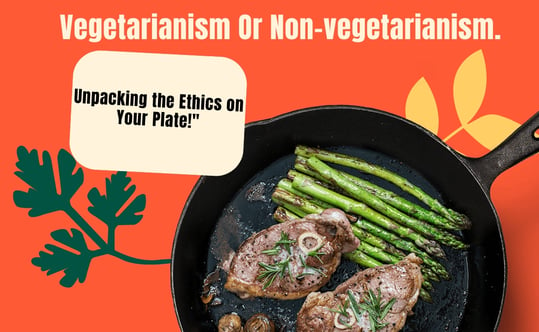Veg vs Non-Veg: A Conscious Choice
The debate over whether to eat vegetarian or non-vegetarian food has persisted for ages, but the real question lies deeper than preference or cultural tradition. It’s about the nature of consciousness and the choices we make, often without truly understanding the impact they have on our world and our own peace of mind.
Chirag
12/21/20242 min read
The Myth of Right and Wrong
At the heart of this debate is the concept of right and wrong. Many argue that our choices are simply personal, shaped by culture or belief. But can right and wrong truly be defined by an action or its consequences? Absolute right and wrong require a subject—an experiencer—someone who can perceive and decide. In this case, that subject is you.
Who Are We Really?
We are often led to believe that our identity is tied to our mind and body. But what if we are not the mind that is shaped by social and biological conditioning? What if we are the experiencer, the consciousness that observes the world rather than actively participating in its creation? This realization is key to understanding our choices, especially when it comes to consumption.
Consumption: A Reflection of Ignorance
When we say "my life, my choice," we are often ignoring a deeper truth: our choices are heavily influenced by nature and society. If we are unaware of the truth behind our beliefs, we are no better than animals acting purely out of instinct. True peace and growth in consciousness come when we shed the false perceptions and become more aware of our actions, especially those that involve the consumption of life.
The Violence of Ignorance
Violence is not just about physical harm; it’s about the lack of self-knowledge and insensitivity to all life. Every time we kill an innocent animal, we kill the possibility of experiencing a pure state of consciousness. The logic behind our consumption needs to be questioned—why do we value human life more than that of an animal? It’s not about killing being good or bad; it’s about how we perceive and justify it.
The Path of Minimum Violence
True growth in consciousness requires us to choose the path of least harm. We must confront the hypocrisy of animal rights and consumption, asking ourselves why it’s considered a crime to harm a street dog, yet acceptable to eat chicken. This twisted logic stems from our unconsciousness and our inability to see the interconnectedness of all life.
Sensitivity Towards All Life
True sensitivity is recognizing that harm to animals is harm to ourselves. If we are not conscious of the lives we take—human or animal—how can we claim to be sensitive towards the world? Living insensitively is living a loveless life, disconnected from the beauty and peace that consciousness can offer.
Conclusion
The choice between vegetarianism and non-vegetarianism is not just about taste or culture. It’s about being sensitive to the truth of our actions and their impact on our consciousness. When we live with awareness, we move closer to a state of peace and compassion, not just for humans, but for all life.


